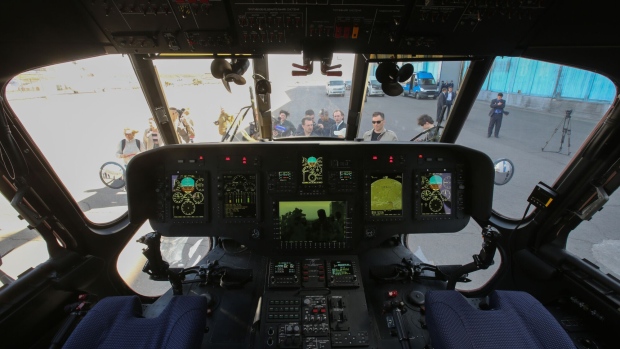Mar 28, 2024
US ‘Kleptocapture’ Group Seeks Russia Sanction Evaders Worldwide
, Bloomberg News

(Bloomberg) -- Latvian authorities have arrested and plan to extradite to the US a local man over his work for a Kansas-based company in the alleged smuggling of avionics equipment through third countries destined for Russia, in violation of US export controls, the Justice Department said Wednesday.
Oleg Chistyakov allegedly worked with US citizens Cyril Buyanovsky and Douglas Robertson, acting as the broker of their company KanRus Trading Company Inc., the department said Thursday in announcing a superseding indictment with charges against him.
Chistyakov was alleged to have facilitated the sale, repair and shipment of American electronic aviation equipment to entities in Russia, including the Federal Security Service, which is Moscow’s intelligence agency.
The indictment details that Chistyakov and his conspirators concealed their illegal activities by elaborate means — creating false invoices, transshipping items through third-party countries, such as Germany and the United Arab Emirates, using bank accounts in countries such as Kazakhstan, Kyrgyzstan, and the UAE, and exporting items to intermediary companies, which then re-exported the items to the end destinations.
Chistyakov was arrested near Riga, Latvia on March 19. Buyanovsky and Robertson were both indicted by a grand jury in Kansas last year. Buyanovsky pleaded guilty and faces sentencing in November. Robertson pleaded not guilty and will go to trial in October.
‘Kleptocapture’ Project
Chistyakov’s arrest is the most recent demonstration of enforcement brought by the Justice and Commerce departments under Task Force Kleptocapture, formed in the aftermath of the Russian invasion of Ukraine. The group is assigned to enforce sanctions, export controls and economic countermeasures the US and its allies have imposed in response to Russia’s invasion, now in its third year.
“It doesn’t matter if you’re in Kansas or in Latvia — if you violate American law, you risk facing American justice,” Matthew Axelrod, assistant secretary of Commerce export enforcement, said in the statement.
The task force was created in March 2022, and along with the confiscation of Russian assets it has amassed since then — yachts, weapons and funds — the group has also worked to keep US-designed dual-use technology off the battlefield.
At the outset of the war, members of the Commerce Department’s Bureau of Industry and Security approached 900 American companies with historic export relationships with Russia to inform them of the regulation changes. Since then, charges have been filed against people living in Belgium, Greece, Estonia and in the US.
Russia is restricted from obtaining at least 50 high-priority items under the Commerce Department’s export controls. They cover most dual-use technologies or components of weapons systems, circuit boards and modules, radars and other types of equipment. The list is constantly being revised, according to an official who asked not to be identified elaborating on the program.
Details of much of what tech was to be restricted was harvested from the battlefield, the official said. The earliest information came from Ukraine and non-governmental organizations that were able to locate model numbers of equipment — such as drones — from the field and pass those on to American officials who then worked to recreate the supply chain.
‘Stepping Up’
“Countries like Estonia and Latvia, countries that are much closer to the conflict and have a real collateral consequence for cooperating with the United States, they’re stepping up,” said David Lim, co-director of the task force. “And so you see these public arrests, these public extraditions to the US so that these very sophisticated procurement agents are prosecuted here in our courts,” he said.
The seizures have been significant, said Michael Khoo, the other director of the task force.
“We have seized hundreds of thousands of rounds of sniper ammunition. We have seized high-precision machine tools that were on their way to Russia to support the defense industry, nuclear proliferation activities and the like,” he said.
Through the Justice Department’s forfeiture authorities, the administration has been able to seize weapons transiting from Iran to Yemen and turn them over to the Ukrainians, he said.
“So, it’s a two-pronged mission. One is to deprive Russia of the tools it needs to sustain its aggression, but it’s also to support Ukraine as they resist that aggression and it’s two sides of a very important coin,” he said.
There are loopholes, however, that still allow Russia to evade western sanctions.
“Our sanctions and export controls are not stopping the North Koreans and the Iranians from providing ammunition and weaponry to the Russians,“ said Evelyn Farkas, executive director of the McCain Foundation, who just returned from a trip to Ukraine. “Iran and North Korea, they’re under their own sanctions that they’re also violating by selling or giving these things to Russia.“
“The export controls that the Ukrainians would like us to put in place are ones aimed at countries like Armenia, the central Asian countries, countries where items are transiting through those countries to Russia,” Farkas said. “They are asking for us to do more to clamp down on the industrial components that might go into replenishing ammunitions and refurbishing the military.“
--With assistance from Daniel Flatley.
©2024 Bloomberg L.P.





